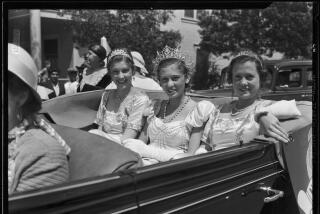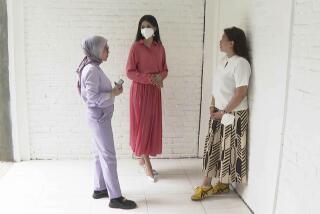China Tests Waters With Beauty Contest
- Share via
BEIJING — Zealous officials bustled through concrete halls that were thick with the smell of hair spray, barking orders at nervous contestants. “Register, register. I want everyone’s name properly registered,” one bureaucrat snapped.
In a small room in the Monita beauty school in western Beijing, China’s first televised beauty contest had officially begun.
Let viewers be forewarned--the bathing suit competition is out. In a new twist on the communist maxim, “to each according to his work,” entrants in this contest will be judged not by their own beauty but by their skill in making others look good.
The pageant, divided into two categories of hair styling and makeup, is scheduled to air on state-run Beijing Television on what Chinese call san ba --March 8--International Women’s Day.
China normally touts the date as a landmark for celebrating women’s avowed communist equality. This year, censors willing, women can mark the day by tuning in to see who will be judged the fairest of them all.
After more than a decade of opening to the West, the days when beauty was considered bourgeois and fashion was dictated by the unisex Mao suit are long gone.
Now Chinese women avidly flip through fashion magazines and snap up foreign and domestic cosmetics. Heavily made-up faces, nail polish and elaborate coiffures are a common sight on city streets.
The March 8 beauty contest was approved relatively quickly but remains subject to censorship, according to the show’s creator.
“This wouldn’t have been appropriate before, but there’s been a lot of progress in the last few years,” said Yao Yuan, a producer at Beijing Television and the driving force behind the contest.
Just three years ago, plans for beauty contests in Shanghai and Beijing were scuttled at the last moment for ideological reasons.
Jiang Zemin, the then-mayor of Shanghai who heads China’s Communist Party, gave an order forbidding the 1988 contest in Shanghai on grounds that “conditions were not yet ripe.”
Despite the current conservative atmosphere, the 1991 contest is going ahead as scheduled.
An official campaign launched against so-called Western “bourgeois liberalism” since the June 4, 1989, crackdown on the democracy movement has so far been confined to combating pornography and suspect political ideas.
Yao appeared confident that the program would air as planned.
At the same time, she admitted that some television officials were nervous about the contest, warning her against showing “anything too Westernized” such as punk hairstyles.
“They could still object and censor it at the last minute,” she said.
For now, the show is on and contestants are hard at work.
Judging from the styles on display at the Monita beauty school, hair spray is the weapon of choice of the more than 50 nonprofessional beauticians and their models competing in the preliminary round.
Semifinalists will vie with professionals in late February to place in the grand contest, to be broadcast March 8-9 in a glitzy two-part special.
After the allotted 15-minute time period, stern-faced judges--all of them middle-aged men--scrutinized each model, jotting down their impressions on a tally sheet.
“We compare the models’ appearances to pictures taken before,” said one judge, whose leather pants and high-heeled boots distinguished him from his Mao-suited colleagues.
With the exception of a guest judge from Hong Kong, the rest are experienced makeup specialists from film studios, including China’s “August 1” studio, run by the People’s Liberation Army.
It has no connection with a foreign-produced, Miss America-style beauty pageant scheduled to air--bathing suit competition and all--from Beijing’s Forbidden City in May.
“This contest is different,” Yao said. “We’re basing it on the entrants’ skills and technical expertise.”
Zheng Li, the show’s editor, agreed. “We’re doing this to help women celebrate Women’s Day,” he said.
More to Read
Sign up for Essential California
The most important California stories and recommendations in your inbox every morning.
You may occasionally receive promotional content from the Los Angeles Times.










